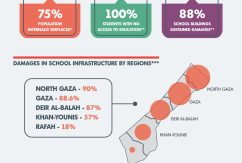Enhancing a gender responsive film sector in the South Mediterranean region
Brief Description
Promoting a non-stereotyped female representation in film and fostering female film professionals are essential components to combat gender-based stereotypes in the film industry and enable freedom of expression as a fundamental human right. This project is another component of UNESCO’s ongoing work to promote gender equality and support freedom of expression throughout countries in the MENA region.
Countries covered: Algeria, Egypt, Jordan, Lebanon, Libya, Morocco and Tunisia.
Objectives
UNESCO aims to promote freedom of expression by encouraging filmmakers to address gender equality and women’s empowerment; promote the role of female film professionals by harnessing and enabling an environment to create and express their own concerns and tackle gender-related stereotypes in films while promoting cultural diversity.
Actions in brief
- Monitoring gender equality in film and within the film industry on the basis of UNESCO’s Gender Sensitive Indicators for the Media (GSIM).
- Creation and dissemination of an online directory of female film professionals as well as the findings of the studies.
- Support to relevant regional and national CSOs in advocating and promoting gender equality in the target countries.
- Sensitization of film industry’s managers, decision makers and professionals on gender related stereotypes and promote cultural diversity principles and safeguarding tools as embedded into the UNESCO 2005 Convention on the Protection and Promotion of the Diversity of Cultural Expressions.
- Sensitization of national public entities supporting film development and creative industries to integrate a gender responsive approach.
- Capacity reinforcement of female film professionals to effectively and independently create and express their own concerns.
- Capacity reinforcement of film producers to integrate a gender responsive approach in the film production.
- Support to film schools in the integration of a gender-responsive approach.
- Conduct a series of film screenings addressing young people and women in rural communities followed by discussion on women’s roles expressed in the films.
- Support women’s participation in the film festivals.































